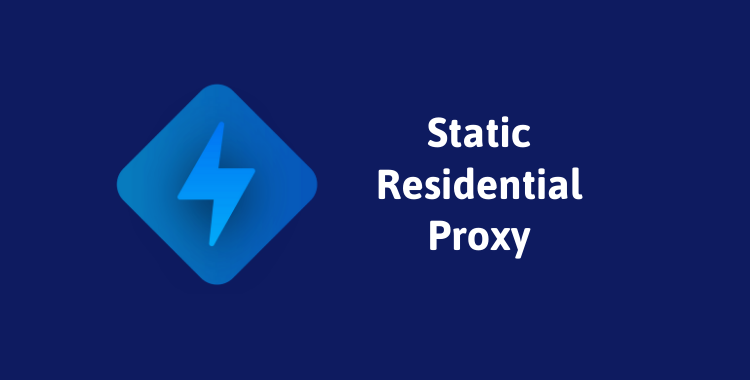
With a proxy server in place, you are able to access the Internet whilst going completely undetected and without direct content. This is because it acts as an intermediary and actively masks your device’s location and Internet Protocol (IP) address, in addition to providing the web server with different details altogether.
What is a Static Residential Proxy?
A static residential proxy is a combination of the best features of a residential proxy and a data center proxy, whilst mitigating against any of the weaknesses that either of these may have.
Because Static Residential Proxies are essentially data center proxies that have been assigned to users by Internet Service Providers (ISPs), they have the same level of speed as them, but because they are traced back to the ISP, they are much less detectable.
With a static residential proxy you can use the same IP address for as long as you need, providing you with a greater amount of anonymity when online.
Benefits of Using a Static Residential Proxy?
So, what makes static residential proxies such a big deal? Why are they worth considering for serious online activities? Let’s explore the key benefits.
1. Reliable Identity Masking
Imagine you’re trying to gather information online, but you keep getting blocked because websites recognize you as a bot or an unwanted visitor. With a static residential proxy, you can avoid these issues.
Since the IP address is recognized as belonging to a real home, websites are less likely to flag your activities. It’s like having a VIP pass that lets you slip through unnoticed.
And because the IP doesn’t change, you maintain a consistent online identity, which is critical if you’re accessing the same sites repeatedly.
2. Enhanced Privacy and Security
Let’s face it, the internet isn’t always a safe place. Every click, every page you visit, leaves a trace. If you’re concerned about privacy—whether from prying eyes, competitors, or even hackers—a static residential proxy offers a layer of protection.
It shields your real IP address, so your actual location and identity remain hidden. It’s like drawing the curtains at home; no one outside can see what you’re up to inside.
3. Bypassing Geolocation Restrictions
Ever tried to access content only to be told it’s not available in your country? Frustrating, right? A static residential proxy can help you get around these annoying restrictions.
Since the proxy IP belongs to a real location, you can choose an IP from a country where the content is accessible. Suddenly, those barriers disappear, and you can access what you need without hassle.
4. Consistent Performance for Web Scraping
If you’re in the business of data collection, like scraping information from multiple websites, consistency is key. Websites often have systems to detect and block IPs that make too many requests.
A static residential proxy helps you stay under the radar. Since the IP doesn’t change, it looks like all your requests are coming from the same, legitimate source, which reduces the chance of getting blocked.
5. Improved Success Rates in E-commerce and Ad Verification
For those involved in e-commerce, especially in price monitoring or ad verification, static residential proxies are a game-changer. Many websites display different prices or ads based on location.
With a static residential proxy, you can access these sites as if you’re in a specific location, ensuring that you’re getting accurate data. It’s like having a trusted local scout who always brings back the right information.
When Should You Use a Static Residential Proxy?
Now that you know the benefits, let’s talk about when it makes sense to use a static residential proxy. It’s not a one-size-fits-all solution, but it’s incredibly effective in certain situations.
- Web Scraping: If you’re collecting large amounts of data from websites, a static residential proxy can help you avoid being flagged or blocked.
- Ad Verification: Ensure the ads you’re paying for are displayed correctly by checking them from different locations using a static IP.
- Market Research: Gather data from various locations without traveling. Just use a proxy from the country you’re interested in.
- SEO Monitoring: Keep an eye on how your site ranks in different regions without constantly changing your IP address.
- E-commerce: Monitor prices and product availability across different regions without being detected.
Potential Drawbacks to Consider
No tool is perfect, right? While static residential proxies are powerful, they come with some considerations you should keep in mind.
- Because these proxies use real residential IPs, they tend to be more expensive than other types of proxies. If you’re on a tight budget, this might be a factor.
- Unlike datacenter proxies, which can be created in large numbers, residential IPs are limited by the number of real homes willing to share their connections. This can make static residential proxies a bit harder to come by.
- Although static residential proxies are generally more trustworthy, there’s still a risk of IP blacklisting if they’re overused or abused. Once an IP is blacklisted, it can become useless for certain tasks.
Understanding these drawbacks can help you make a more informed decision. Sometimes, the benefits far outweigh the downsides, especially if your work relies heavily on reliable, consistent access to certain online resources.
